I love to read. By God’s grace I am a pretty fast reader; I usually read a couple books each week. I find it helpful to summarize my thoughts on each book and I offer those thoughts in the hope that you will be encouraged to either read or pass over the given title.
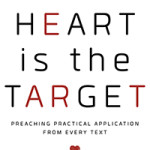 The Heart is the Target: Preaching Practical Application from Every Text by Murray Capill. There are relatively few books in the homiletical market exclusively concerned with application in sermons. The one I most often see referenced is Dan Doriani’s Putting Truth to Work, but for a variety of reasons his work feels dated. Bursting into the fray is an Aussie you’ve probably never heard of: Murray Capill. Capill is principal of Reformed Theological College in Geelong, Australia and he’s given us a masterstroke in The Heart is the Target. I generally judge preaching books not merely on their usefulness, but on if they stir fresh desire for the work. At almost every turn Capill made me want to put down his book, take up The Book, and go preach.
The Heart is the Target: Preaching Practical Application from Every Text by Murray Capill. There are relatively few books in the homiletical market exclusively concerned with application in sermons. The one I most often see referenced is Dan Doriani’s Putting Truth to Work, but for a variety of reasons his work feels dated. Bursting into the fray is an Aussie you’ve probably never heard of: Murray Capill. Capill is principal of Reformed Theological College in Geelong, Australia and he’s given us a masterstroke in The Heart is the Target. I generally judge preaching books not merely on their usefulness, but on if they stir fresh desire for the work. At almost every turn Capill made me want to put down his book, take up The Book, and go preach.
Capill, for my mind, gets just about everything right. I can’t see a pastor picking this up without it changing something in his preparation and delivery of God’s word. I hope The Heart is the Target gets the widest audience possible. Grab a copy today and let Capill sharpen your skills with the Spirit’s sword.
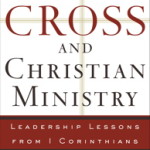 The Cross and Christian Ministry: Leadership Lessons from 1 Corinthians by DA Carson. On Sunday I grabbed Carson’s famous book on the gospel ministry off a shelf in my study and was shocked to find I hadn’t read it yet! I guess it was the Spirit’s saying, “Tolle lege.” The work is simply enough: Carson walks through various passages in 1 Corinthians to show how the cross relates to preaching, the Holy Spirit, factionalism, servant-leadership, and forming believers into “world Christians.” The book is more a commentary on 1 Corinthians than 1 Corinthians applied to pastoral ministry. For some that will be a good thing, but for others it may be somewhat disappointing.
The Cross and Christian Ministry: Leadership Lessons from 1 Corinthians by DA Carson. On Sunday I grabbed Carson’s famous book on the gospel ministry off a shelf in my study and was shocked to find I hadn’t read it yet! I guess it was the Spirit’s saying, “Tolle lege.” The work is simply enough: Carson walks through various passages in 1 Corinthians to show how the cross relates to preaching, the Holy Spirit, factionalism, servant-leadership, and forming believers into “world Christians.” The book is more a commentary on 1 Corinthians than 1 Corinthians applied to pastoral ministry. For some that will be a good thing, but for others it may be somewhat disappointing.
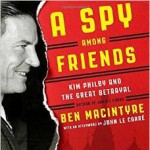 A Spy Among Friends: Kim Philby and the Great Betrayal by Ben Macintyre. Studying Cold War espionage has long been a favorite hobby of mine. No Cold War spy was more prolific and destructive than Kim Philby, a Soviet mole in MI6 who stole secrets and sabotaged operations for over two decades. Macintyre is the perfect author for this tale; he has perfected the art of narrative espionage-history in recent years. His main contribution to “Philby Cottage Industry” is his recounting the traitor’s life through the lens of friendship. Particularly his friendship with two spy masters and supposed allies: Nicholas Elliot of MI6 and the legendary mystery man of the CIA, James Jesus Angleton. A Spy Among Friends is Macintyre’s best book to date, I simply could not put it down.
A Spy Among Friends: Kim Philby and the Great Betrayal by Ben Macintyre. Studying Cold War espionage has long been a favorite hobby of mine. No Cold War spy was more prolific and destructive than Kim Philby, a Soviet mole in MI6 who stole secrets and sabotaged operations for over two decades. Macintyre is the perfect author for this tale; he has perfected the art of narrative espionage-history in recent years. His main contribution to “Philby Cottage Industry” is his recounting the traitor’s life through the lens of friendship. Particularly his friendship with two spy masters and supposed allies: Nicholas Elliot of MI6 and the legendary mystery man of the CIA, James Jesus Angleton. A Spy Among Friends is Macintyre’s best book to date, I simply could not put it down.
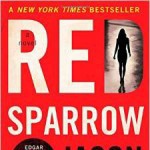 Red Sparrow by Jason Matthews. Matthews spent thirty-three in the CIA and upon retirement he did what many former intelligence officers have done: write a spy novel. Yet, Matthews is unlike those who’ve come before. He’s actually really good a telling a realistic spy tale. The Company itself said, “The amount of tradecraft, particularly surveillance and countersurveillance, will make the in-house reader wonder how he got all this past the Publications Review Board.” The novel isn’t perfect though. The pacing is unbalanced at several points, the content unnecessarily lascivious (especially early on), and his depiction of Russia one dimensional. Nevertheless, Red Sparrow is a gripping portrait of modern day espionage and I hope Matthews is no one-hit wonder.
Red Sparrow by Jason Matthews. Matthews spent thirty-three in the CIA and upon retirement he did what many former intelligence officers have done: write a spy novel. Yet, Matthews is unlike those who’ve come before. He’s actually really good a telling a realistic spy tale. The Company itself said, “The amount of tradecraft, particularly surveillance and countersurveillance, will make the in-house reader wonder how he got all this past the Publications Review Board.” The novel isn’t perfect though. The pacing is unbalanced at several points, the content unnecessarily lascivious (especially early on), and his depiction of Russia one dimensional. Nevertheless, Red Sparrow is a gripping portrait of modern day espionage and I hope Matthews is no one-hit wonder.
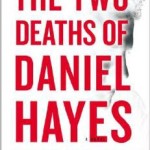 The Two Deaths of Daniel Hayes by Marcus Sakey. I was completely taken with Sakey’s “The Brilliance Saga,” but do his other works match the magic? To answer that question I picked up The Two Deaths of Daniel Hayes, Sakey’s last publication before all the brilliance arrived. Gillian Flynn calls the story of Hayes, “A brainy, twisty, sometimes twisted mystery.” I did find it a bit twisted, but – on the whole – it’s terrifically twisty. At several points the plot line shifts rather dramatically and the turns are mostly believable, if somewhat conventional. The more I read Sakey the more I find him to be some sort of Connelly/Flynn blend. And that mixture will win many a fan.
The Two Deaths of Daniel Hayes by Marcus Sakey. I was completely taken with Sakey’s “The Brilliance Saga,” but do his other works match the magic? To answer that question I picked up The Two Deaths of Daniel Hayes, Sakey’s last publication before all the brilliance arrived. Gillian Flynn calls the story of Hayes, “A brainy, twisty, sometimes twisted mystery.” I did find it a bit twisted, but – on the whole – it’s terrifically twisty. At several points the plot line shifts rather dramatically and the turns are mostly believable, if somewhat conventional. The more I read Sakey the more I find him to be some sort of Connelly/Flynn blend. And that mixture will win many a fan.
Click here to find other entries in the Recent Reads series.

“judge preaching books not merely on its usefulness, but if they stir a fresh desire for the work.”
I like that standard of measurement.